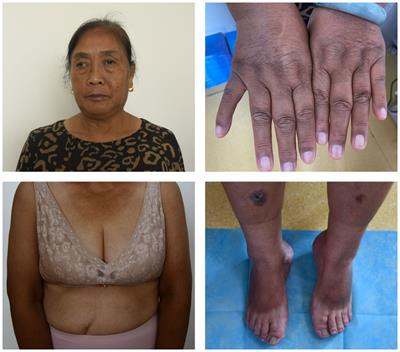Hydroxychloroquine-induced hyperpigmentation of the skin and bull’s-eye maculopathy in rheumatic patients: a case report and literature review

Hydroxychloroquine (HCQ) is used as a traditional disease-modifying antirheumatic drugs (DMARDs), for the treatment of autoimmune diseases such as rheumatoid arthritis (RA) and systemic lupus erythematosus (SLE). However, it can cause serious adverse reactions, including hyperpigmentation of the skin and bull’s-eye macular lesions. Here, we present a case of HCQ-induced hyperpigmentation of the skin and bull’s-eye macular lesions in a patient who received HCQ for RA. A 65-year-old female patient developed blurred vision and hyperpigmentation of multiple areas of skin over the body for one month after 3 years of HCQ treatment for RA. Based on clinical presentation, ophthalmological examination and dermatopathological biopsy, a diagnosis of drug-induced cutaneous hyperpigmentation and bullous maculopathy of the right eye was made. After discontinuation of HCQ and treatment with iguratimod tablets, the hyperpigmentation of the patient ‘s skin was gradually reduced, and the symptoms of blurred vision were not significantly improved. We also reviewed the available literature on HCQ-induced cutaneous hyperpigmentation and bull’s-eye macular lesions and described the clinical features of HCQ-induced cutaneous hyperpigmentation and bull’s-eye macular lesions. In conclusion, clinicians should be aware of early cutaneous symptoms and HCQ-associated ophthalmotoxicity in patients with rheumatic diseases on HCQ sulphate and should actively monitor patients, have them undergo regular ophthalmological examinations and give appropriate treatment to prevent exacerbation of symptoms..
Read the full article at the original website
References:
